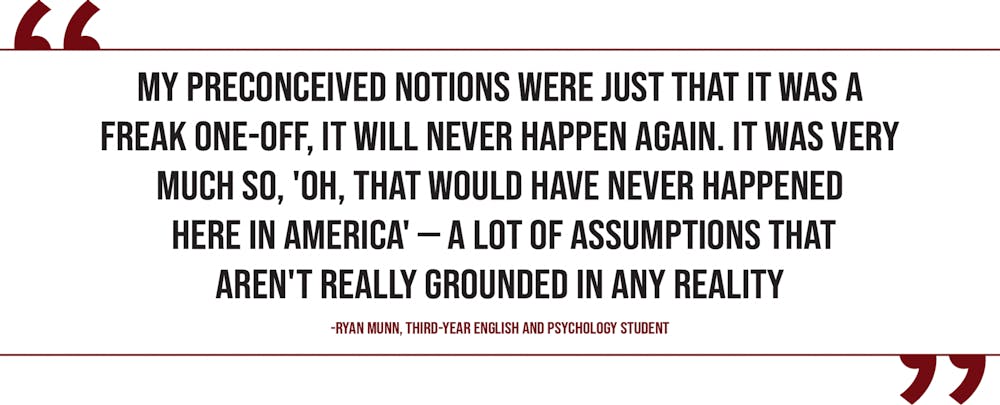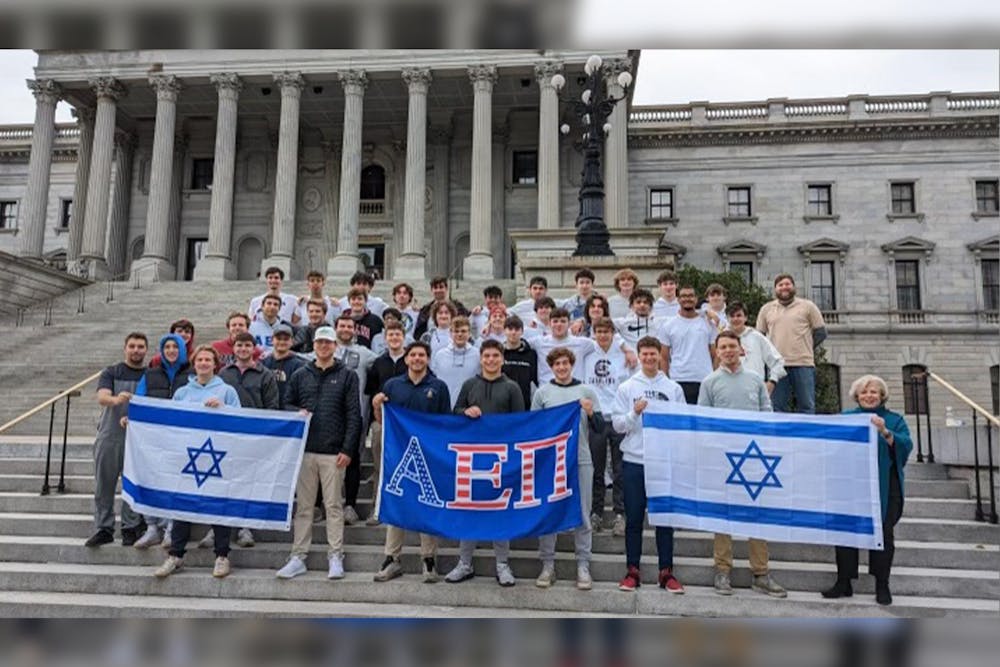Walk to Remember, an event hosted by USC's Jewish Fraternity AEPi, focused on commemorating Holocaust Remembrance Day this year as well as highlighting growing concerns about a rise in anti-Semitism and lack of Holocaust education.
Alongside AEPi, the remembrance event hosted speakers from the Anne Frank Center, the Jewish studies department at USC and the Chabad religious group.
During the event, USC students and staff discussed the shortcomings of the current Holocaust education, and the negative Jewish stereotypes that may be fueling this.
Ethan Brawer, a first-year business student and AEPi's Jewish idenity chair, said he feels like most people know only know surface-level information about how the Holocaust came to be.
"When it comes to the deeper truths about it, I feel like those aren't really known, like how it was all propaganda and how it was really this kind of hateful speech that brought just regular people to commit these atrocities," Brawer said.
According to F.K. Clementi Schoeman, an USC associate professor of English and Jewish studies, these stereotypes have been prevalent throughout history and were an initial driving force of the Holocaust. Schoeman said that even though such stereotypes have been detrimental to a group of people, they are often overlooked when examining history through an objective lens.
“(The Holocaust) was not just something that happened. The same world that saw the Jews as scheming, greedy, dangerous, disloyal, cowardly, subhumans was still there after Hitler died and the war was over,” Schoeman said.
Schoeman said that the key to Holocaust education is making the connection between hate and genocide, which has become increasingly important as the years between the Holocaust and the present continue to grow.
“The historical facts are so far behind us, that newer generations are more detached from them, and they understand much less,” Schoeman said.
While there is often a lack of Holocaust-specific education at the high school level, many students come into Jewish studies classes curious to learn more, Schoeman said.
One of her students, third-year English and psychology student Ryan Munn, said he did not receive a whole lot of education on the Holocaust, prior to taking Schoeman's class.
“It wasn’t avoided, but it was very seldom mentioned, and when it was, it was only mentioned in relation to World War II,” Munn said.
Munn said that before taking the class, he never really thought about anti-semitism existing outside of the Holocaust era.
“My preconceived notions were just that it was a freak one-off, it will never happen again. It was very much so, 'Oh, that would have never happened here in America' — a lot of assumptions that aren't really grounded in any reality," Munn said.

Other areas of campus, like The Anne Frank Center, are also looking to provide educational programs about the Holocaust.
“It’s very difficult to assess knowledge of the Holocaust overall. There are basic facts that we wished more people knew. And with all the disinformation on the internet, there are troubling trends," Doyle Stevick, director of the USC Anne Frank Center, said. "It’s difficult to do justice to the complexity and scale and horror of the Holocaust.”
While Stevick said he wishes there was more basic education about the Holocaust, he isn’t worried about people forgetting the genocide.
“All across the country, I see dedicated individuals and institutions committed to remembering the Holocaust, not just within Jewish communities," Stevick said. "That encourages me that there will always be a group of people committed to making sure you don’t forget."
Stevick also said the center's Holocaust education focuses around making sure students are informed of the magnitude of the Holocaust in order to prevent the development of future acts of hate.
“Anything that happened can happen again. And unfortunately, the same ideology that costs so many lives is just a click away,” Stevick said. “We need to protect all of our students from falling for this nonsense and protect all of our people from being the targets of hateful ideologies.”

